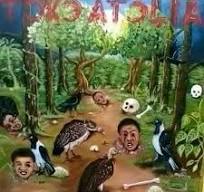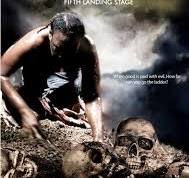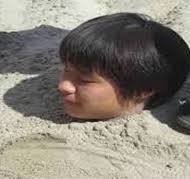In the heart of the Anlo Kingdom, a land rich with history and tradition, lies the practice of "Torkor Atorlia," an ancient form of punishment from the days of old. This cultural artifact of the Anlo people, specifically from the Fifth Landing Stage, offers a glimpse into the historical methods used to maintain order and discipline within the community.
Exploring Torkor Atorlia:
"Torkor Atorlia," roughly translated to "the Fifth Landing Stage" in the Ewe language, represents a method of punishment that dates back centuries within the Anlo Kingdom. In this traditional form of justice, individuals who transgressed societal norms were subjected to public reprimand and correction, they were buried leaving their heads off for the wild birds to feed on.

The Fifth Landing Stage served as a communal area where wrongdoers were brought before the community elders and chiefs. Here, they would face various forms of correction, ranging from physical discipline to laborious tasks aimed at both atonement and education. The intent was not only to punish the offender but also to educate the community about the consequences of deviating from established norms.
In Torkor Atorlia, perpetrators of crimes are buried alive from their toes to their necks with their heads left for birds and other wild animals to prey on.
The operation is usually undertaken by warlords in the vicinity.
In narrating the procedures involved in the execution process, the spokesperson for the Awormefia of Anlo, Agbotadua Kumasa said parents were the key people who handed over their children to the warlords for punishment.
He said the family system was unique hence any child who tarnished the image of their family faced the consequences of their action.
Crude as it may be, some residents believe it was the surest way to bring sanity to the area.

As to whether the system can be reinstated, Senanu Bedzrah, a teacher and resident who was born and bred in Anloga in sharing his views said bringing back the system is not important, though it may be a way to curb crime. He rather wants authorities to make sure the by-laws of the localities are implemented.
Should such punishments return?
In modern times, discussions have emerged about the relevance of these ancient practices, particularly in light of challenges related to discipline among the youth.
Some residents and scholars argue that reintroducing elements of "Torkor Atorlia" could offer a solution to contemporary issues such as juvenile delinquency and lack of respect for societal values.
Proponents for the return of these punishments suggest that they could serve as a deterrent, instilling a sense of discipline and responsibility among the younger generation. They argue that the community's involvement in correcting wayward behaviour could foster a stronger sense of unity and shared values.
Reactions from the Community:
In light of these discussions, we reached out to a resident of the Anlo Kingdom, Senanu Bedzrah , to gather his thoughts on the matter. Senanu, a long-time member of the community, expressed mixed feelings about the idea of reviving "Torkor Atorlia."
"While I appreciate the need for discipline among our youth," Senanu shared, "I also worry about the potential for abuse or misunderstanding of these traditional practices. Our society has evolved, and we must find modern ways to address discipline issues without resorting to outdated methods."
Additionally, we sought the perspective of a traditional ruler from the region, the spokesperson for the Awormefia , Agbotadua Kumasah, who emphasized the importance of preserving cultural heritage while adapting to changing times.
"Torkor Atorlia holds a significant place in our history," Agbotadua Kumasah remarked. "However, we must tread carefully when considering its reintroduction. Education, mentorship, and community engagement are key to guiding our youth towards positive behaviour."
Conclusion:
As the Anlo Kingdom reflects on its ancient culture and traditions, the debate over the revival of "Torkor Atorlia" continues.
While some advocate for its return to instill discipline, others urge a cautious approach, emphasizing the need for modern solutions rooted in community engagement and education.
So the question is, should Torkor Atorlia be brought back into the system? Will the Human Rights activists endorse this? The central point is that discipline should be the main aim of every society to bring sanity and order in our communities.
Whether "Torkor Atorlia" resurfaces as a tool for correction or remains a relic of the past, its legacy serves as a reminder of the enduring traditions and values of the Anlo people.
Latest Stories
-
Paris 2024: Opening ceremony showcases grandiose celebration of French culture and diversity
3 hours -
How decline of Indian vultures led to 500,000 human deaths
4 hours -
Paris 2024: Ghana rocks ‘fabulous fugu’ at olympics opening ceremony
4 hours -
Trust Hospital faces financial strain with rising debt levels – Auditor-General’s report
4 hours -
Electrochem lease: Allocate portions of land to Songor people – Resident demand
5 hours -
82 widows receive financial aid from Chayil Foundation
5 hours -
The silent struggles: Female journalists grapple with Ghana’s high cost of living
5 hours -
BoG yet to make any payment to Service Ghana Auto Group
5 hours -
‘Crushed Young’: The Multimedia Group, JL Properties surprise accident victim’s family with fully-furnished apartment
6 hours -
Asante Kotoko needs structure that would outlive any administration – Opoku Nti
6 hours -
JoyNews exposé on Customs officials demanding bribes airs on July 29
6 hours -
JoyNews Impact Maker Awardee ships first consignment of honey from Kwahu Afram Plains
8 hours -
Joint committee under fire over report on salt mining lease granted Electrochem
8 hours -
Life Lounge with Edem Knight-Tay: Don’t be beaten the third time
8 hours -
Pro-NPP group launched to help ‘Break the 8’
8 hours

